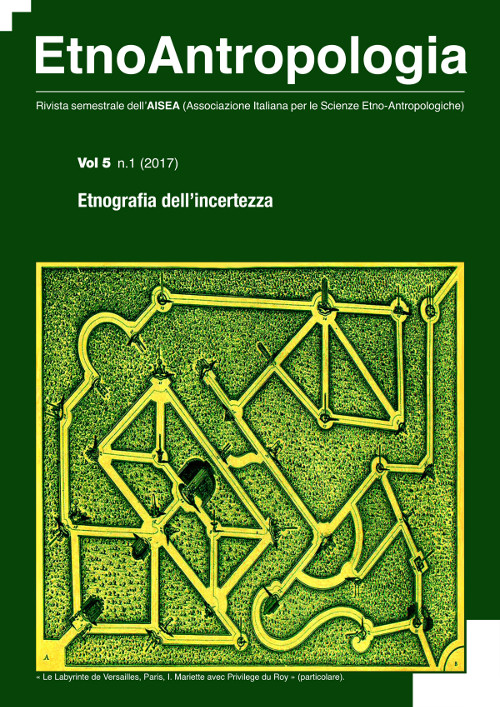Incertezza e cambiamento climatico nell’era dell’Antropocene
DOI:
https://doi.org/10.1473/233Parole chiave:
Crisis, Climate Change, Anthropocene, Perception, Science.Abstract
Climate change appears as a major driver of identity crisis, affecting changes at local and global level in terms of spaces, security, livelihood and weather. The prevailing narration on climate change describes unfamiliar scenarios struck by exceptional events, that rarely can be connected with personal experiences. Yet, smaller but more subtle consequences of climate change occur in cities and in metropolitan areas, that suddenly appear fragile and risky contexts. The paper explores the notion of climate change, which is investigated in its constructive dimensions considering how scientific facts and social meanings contribute to shape the very notion of climate, across time and across disciplines.
Riferimenti bibliografici
Armiero M., Barca S. 2004, Storia dell'ambiente, Roma: Carocci.
Barad K. 2012, Nature’s Queer Performativity, «Kvinder, Køn & Forskning», 1-2: 25-53.
Bougleux E. 2015, Issues of Scale in the Anthropocene, «Archivio Anthropologico Mediterraneo», XVIII, 17(1), 67-73.
Chakrabarti D. 2009, The Climate of History, «Critical Enquiry», 35 (2): 197-222.
Crate S. A. 2011, Climate and Culture: Anthropology in the Era of Contemporary Climate Change, «Annu. Rev. Anthropol.», 40: 175-94.
Crate S. A., Nuttal M. (eds.) 2009, Anthopology and Climate Change. From Encounters to Action, Walnut Creek: Left Coast Press.
Crutzen P.J., Steffen W. 2003, How Long Have We Been in the Anthropocene, «Climatic Change» 61: 251–257.
De Certau M. 2005, La scrittura dell’altro, Milano: Raffaello Cortina.
Dove M. (ed.) 2014, The Anthropology of Climate Change. A Historical Reader, Malden: Wiley Blackwell.
Gosh A. 2017, La grande cecità. Il cambiamento climatico e l’impensabile, Vicenza: Neri Pozza.
Hamilton C. 2012, L’economista mistico, Milano: Affari Italiani Editore.
Hannerz U. 1998, La Complessità culturale, Bologna: Il Mulino.
Haraway D. 2015, Anthropocene, Capitalocene, Plantationocene,
Chthulucene: Making Kin, «Environmental Humanities», 6: 159-165.
Hulme M. 2009, Why We Disagree About Climate Change, Cambridge: Cambridge University Press.
Hulme M. 2013, Exploring Climate through Science and Society, London and New York: Routledge.
IPCC 2014, Climate Change 2014: Impacts, Adaptation, and Vulnerability. Working Group II Report, Cambridge, Cambridge University Press.
Latour B. 2004, Politics of Nature. How to Bring Sciences into Democracy, Cambridge: Harvard University Press.
Matera V. 2015, La Scrittura etnografica, Milano: Eleuthera.
Norgaard K.M. 2001, Living in Denial. Climate Change, Emotions, and Everyday Life, Boston: MIT Press.
Pellizzoni L. 2015, Ontological Politics in a Disposable World. New York e Londra: Routledge.
Steffen W. et al. 2011, The Anthropocene: From Global Change to Planetary Stewardship, «AMBIO. A Journal of the Human Environment», 40: 739-761.
Pubblicato
Come citare
Fascicolo
Sezione
Licenza
Gli autori mantengono i diritti sulla loro opera e cedono alla rivista il diritto di prima pubblicazione dell'opera, contemporaneamente licenziata sotto una Licenza Creative Commons - Attribuzione che permette ad altri di condividere l'opera indicando la paternità intellettuale e la prima pubblicazione su questa rivista.
Gli autori possono diffondere la loro opera online (es. in repository istituzionali o nel loro sito web) prima e durante il processo di submission, poiché può portare a scambi produttivi e aumentare le citazioni dell'opera pubblicata (Vedi The Effect of Open Access).





